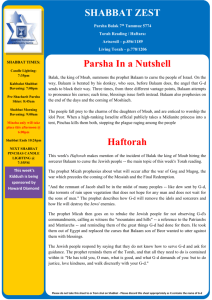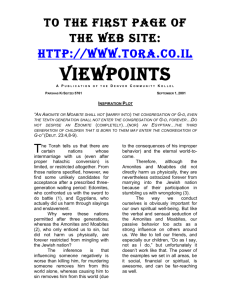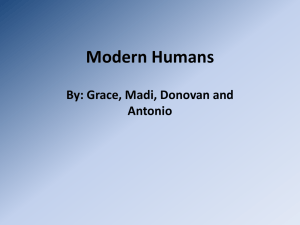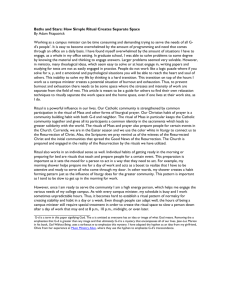THE ANOINTMENT OF KING DAVID:
advertisement
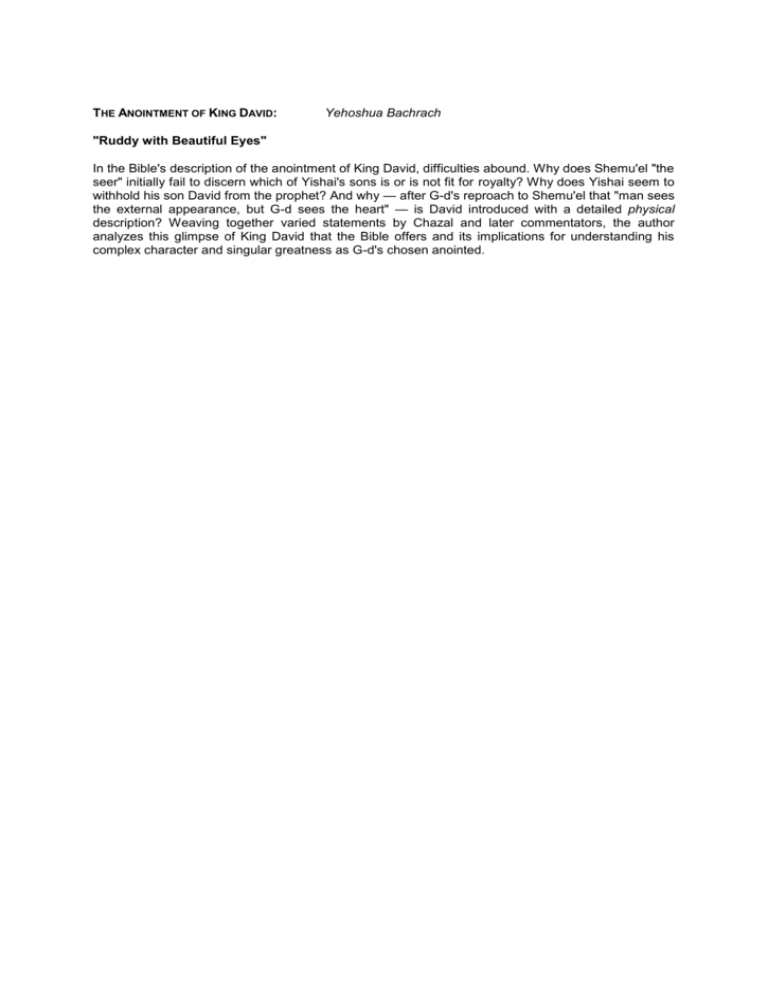
THE ANOINTMENT OF KING DAVID:
Yehoshua Bachrach
"Ruddy with Beautiful Eyes"
In the Bible's description of the anointment of King David, difficulties abound. Why does Shemu'el "the
seer" initially fail to discern which of Yishai's sons is or is not fit for royalty? Why does Yishai seem to
withhold his son David from the prophet? And why — after G-d's reproach to Shemu'el that "man sees
the external appearance, but G-d sees the heart" — is David introduced with a detailed physical
description? Weaving together varied statements by Chazal and later commentators, the author
analyzes this glimpse of King David that the Bible offers and its implications for understanding his
complex character and singular greatness as G-d's chosen anointed.
THE ANOINTMENT OF KING DAVID:
"Ruddy with Beautiful Eyes"
Yehoshua Bachrach
RABBI BACHRACH, a prolific writer on Nach, has authored several books, including Imah Shel
Malchuth, published in translation as Mother of Royalty (Yerushalayim: Feldheim, 1973). Through his
numerous published works and lectures, he has had profound impact on the study of Nach in Israel.
Jewish Thought has featured several of his essays.
The essay that follows is based upon the source provided below:
[Shemu'el] said
[to the elders of Beith Lechem], "Peace,
I have come to sacrifice to G-d.
Prepare yourselves,
and come with me to the sacrifice."
He prepared Yishai and his sons,
and he called them to the sacrifice.
It happened when they came,
that he saw Eli'av.
He said,
"Surely before G-d is His anointed."
G-d said to Shmu'el,
"Do not look at his appearance
and at the height of his stature,
for I have rejected him.
For it is not as man sees:
For man sees the external appearance,
but G-d sees the heart."
Yishai called Avinadav,
and he had him pass before Shmu'el.
He said,
"Also this was not chosen by G-d."
Yishai had Shammah pass.
He said,
"Also this was not chosen by G-d."
Yishai had his seven sons pass
before Shemu'el.
Shemu'el said to Yishai,
"G-d has not chosen these."
Shmu'el said to Yishai,
"Does this complete all your children?"
He said, "The smallest still remains,
and he is tending the sheep."
Shemu'el said to Yishai,
"Send and fetch him,
for we shall not sit down to eat
until he comes here!"
He sent and brought him,
and he was ruddy with beautiful eyes,
and good looking.
— G-d said,
"Arise, anoint him, for this is he!"
Shemu'el took the horn of oil,
and he anointed him
in the midst of his brothers.
The spirit of G-d came upon David,
from that day onward.
Shemu'el arose, and he went to Ramah.
(Shemu'el I 16:5-13)
1.
INTRODUCTION: THE SEER DOES NOT SEE
The anointment of King David stands out as an event fraught with tension and charged with
emotion, as Shemu'el sets out humbly to fulfill G-d's command and anoint the replacement for his
beloved King Sha'ul. Particularly striking is the singular ignorance that all of the principal characters
display regarding the final outcome. Neither Shemu'el the prophet nor Yishai the father recognize
G-d's anointed before G-d urges Shemu'el, practically in rebuke, "Arise, anoint him, for this is he!"
(Shemu'el I 16:12). David emerges as a forsaken shepherd to become king: "The stone disdained by
the builders has become the head cornerstone" (Tehillim 118:22). Indeed, in every sense, "This is
G-d's doing; it is wondrous in our eyes" (ibid. 119:23).
Difficulties in the text abound. But what is perhaps most bothersome is the very unexpected
quality of all that happens here. Scripture emphatically indicates to what extent no one, and especially
not Shemu'el the seer, can truly see. Elsewhere, in the case of the prophecy of Mosheh, we have
encountered similar limitations on a prophet's ability to know:
"Mosheh brought their case before G-d" (BeMidbar 27:5) — There are those who say that
[G-d] concealed [this law] from Moshe, for there are tzaddikim who prided themselves on
the performance of a mitzvah, and the Holy One Blessed Be He weakened their power.
(BeM.R. 21:22)
Similarly here, Shemu'el's concern and sorrow for Sha'ul1 — because of the prophet's deep love for
him — had weakened his power and reduced his prophetic capacity. 2 It is this concern that robbed
him of happiness in the performance of the mitzvah that G-d had entrusted to him this day. Therefore,
the seer did not see.3
Even on this day, while in Beith Lechem together with Yishai and his sons, Shemu'el did not
cease to pray in his heart for Sha'ul:
"It happened when they came, that he saw Eli'av. He said, 'Surely before G-d is His
anointed.'" (Shemu'el I 16:6) — This means that [Shemu'el] said, either in his heart or in his
mouth, that he thought that this one was the king that the L-rd had commanded him to
anoint, since he was the first-born of Yishai's sons. In addition, [Shemu'el] saw in him the
beautiful form and stature of Sha'ul.
And others explain that when [Shemu'el] said, "Surely before G-d is His anointed," he
was still pleading for Sha'ul [currently, still "His anointed"] — that sovereignty should not
depart from him — when he saw that Eli'av was not as handsome as [Sha'ul]. And he
entreated G-d not to replace Sha'ul with anyone else [i.e., to maintain him "before G-d"].
Therefore, the L-rd answered him, "Do not look at his appearance … for I have
rejected him" (ibid. 16:7). It was Sha'ul who was handsome in appearance and tall of
stature.
(Radak, ibid.)
In any case, in his quest for G-d's anointed, Shemu'el — unlike G-d — did not see "the heart."
Typically, in the entire narrative, Scripture abbreviates. It does not describe how the father must
have rejoiced in his offspring when the prophet disclosed his secret: that G-d had chosen one of
Yishai's sons to be king. It also withholds from us any portrayal of whether Yishai noticed the seer's
change of face when G-d rejected Eli'av and rebuked Shemu'el. With characteristic brevity, it tersely
conveys the unfolding drama as Yishai's sons pass before the prophet:
Yishai called Avinadav, and he had him pass before Shemu'el.
He said, "Also this was not chosen by G-d."
Yishai had Shammah pass.
He said, "Also this was not chosen by G-d."
(Shmu'el I 16:8-9)
One by one, Yishai passed his sons before the prophet. Over each one of them he pondered,
considered, and prayed, as they came and as they went. This procedure undoubtably lasted long and
was fraught with tension.
During this time, did Yishai not think also of his young son, the one he had left behind tending the
sheep?
Yishai had his seven sons pass before Shemu'el.
Shemu'el said to Yishai, "G-d has not chosen these."
(ibid. I 16:10)
Yishai hears Shemu'el's statement and his trembling and faltering voice. For now the prophet stood
amazed and afraid: G-d had sent him to see,4 and he sees not. Yishai sees all this, and yet Yishai is
silent.
Finally, perhaps in desperation, Shemu'el turns to Yishai: "Does this complete all your children?"
(Shemu'el I 16:11). One wonders how Shemu'el could still continue to ask Yishai. Did he believe in his
question, that Yishai in fact had another son whom he was concealing? Perhaps in despair he poses
this final question. And Yishai responds:
He said, "The smallest still remains, and he is tending the sheep."
(ibid.)
Weakly, Yishai replied, as if excusing himself. We note that Yishai is not mentioned here by name,
even though properly his name should have been written. (Indeed, the clause "Shemu'el said to
Yishai" is written three times in these two verses, but never once is it written, "Yishai said.") Also
anomalously, both the question and the answer are presented in a single verse. With these words,
Scripture introduces us to King David.
2.
THE SMALLEST STILL REMAINS
"The Smallest"
Is it because David was small that his father had left him behind and deemed it unnecessary to
bring him along to the prophet? Why then did Yishai bring along David's younger brother, Elihu, the
eighth of his sons?5 And if David were indeed small, why did his father appoint him to tend the sheep,
as a shepherd in the wilderness — a place of danger, where the lion and the bear 6 lie in wait?
For this was the task for which Yishai had designated him from among all his father's family. He
was the guarantor of the sheep, and he would be required throughout to care for them. Even while
serving as Sha'ul's minstrel, "he would go to and fro ... to tend his father's sheep in Beith-Lechem"
(Shemu'el I 17:15).
Indeed, thus did David's elder brother scold him when he saw him lingering on the battlefield:
Eli'av's anger burned against David,
and he said, "Why did you come down here?
And with whom did you abandon those few sheep in the wilderness?
I know your malicious intent and your evil desire…."
(ibid. 17:28)
"And with whom did you abandon those few sheep?" Were there not another four brothers who
remained at home? But shepherding was not their responsibility. Therefore, it is written, "David rose
early in the morning, and he left the sheep with a keeper" (ibid. 17:20).
According to Seder Olam, David was twenty-eight years old at this time. We are obliged then to
understand why Yishai called him "the smallest," implying that he was the least worthy to be brought
before the prophet.
"And He is Tending the Sheep"
The original Hebrew text inserts "( "הנה רעה בצאןlit. "And behold he is tending the sheep"). I do not
know how we are to read this ""( "הנהand behold"): whether as support for an excuse — as in "And
behold ( )והנהthe smallest is with our father this day" (BeReshith 42:13) — or as a complaint against
the subject — as in "And behold ) (והנהa member of my household is my heir" (ibid. 15:3).
Shepherding had been favorably regarded in the days of the patriarchs. But now that the land
had been settled, it was considered a despicable occupation, because of the ten conditions imposed
by Yehoshua and his court when he apportioned the land among the tribes:
One may not raise goats and sheep in Eretz Yisra'el, but one may raise [them] in Syria and
in the wildernesses of Eretz Yisra'el.
(Babba Kamma 79b, Yad Hil. Nizkei Mamon 5:2)
Shepherds of goats and sheep in Eretz Yisra'el are disqualified as witnesses.
(Sanhedrin 25b)
Apparently there was some reason in Yishai's household for which they subordinated David and
sent him away to be a shepherd in the distant wilderness, estranged and separated from his brothers:
I am estranged to my brothers, and an alien to my mother's children.
(Tehillim 69:9)
He was despised by his father because as a child he would predict: "I am destined to
destroy the Pelishti localities and to kill a great man from among them named Golyath. And I
am destined to build the Beith HaMikdash." What did his father do? He left him to tend the
sheep.
(Mid. HaGadol on Devarim 1:17)7
Thus, even when Shmu'el specifically "prepared Yishai and his sons, and he called them to the
sacrifice" (Shemu'el I 16:5), David "the smallest" remained forsaken with the sheep. 8
"Send and Fetch Him"
And even after the prophet's question, Yishai was still sitting and waiting. He did not rise up and
say to the prophet, "By your leave, sir, I shall hurry and go, or send for him, and bring him." He
remains silent, and it is Shemu'el who speaks:
Shemu'el said to Yishai, "Send and fetch him,
For we shall not sit down to eat until he comes here!"
(ibid. I 16:11)
Perhaps Shemu'el cast a glance at him, wondering why David had not been brought at the
outset. Perhaps the exclamation burst forth from his lips: "Send and fetch him!" — a peremptory,
urgent demand.
At that moment, Shemu'el recovered from his disappointment at being prevented from fulfilling his
mission, to see what G-d had commanded him: "For I have seen among his sons a king for Me" (ibid.
I 16:1). And here now he sits, waiting for this wondrous youth who had been concealed from him all
that day.
We can only imagine the tension mounting in anticipation of David's arrival. In addition to the
venerable prophet, the elders who had been invited to participate in the sacrificial feast remain
waiting: They could not sit down to eat, since Shemu'el would not bless the sacrifice until David came.
Yishai and his sons, too, sat and waited, revealing their astonishment to one another: The prophet
had said regarding them all, "G-d has not chosen these." Would He then choose this one — David?
The Midrash comments on this wait for David:
"For we shall not sit down to eat until he comes here" — Said R. Shemu'el b. Nachmani:
Just as I this world, two great men — Shemu'el and Yishai — did not sit down to eat
together until David sat in their midst, so in the hereafter there is not a single division of the
just over which David does not preside.
(Mid. Shemu'el, ibid.)
"He Sent and Brought Him"
Who sent? Who brought him? Did not Yishai, his father, send to bring him? Why then is his name
not mentioned? Perhaps Scripture is alluding to the unmentioned One, Who has been manipulating
all of the events that have led up to this moment. Yishai is the instrument, but not the One Who sent
and brought David:
"And the chief butler did not remember Yosef; he forgot him" (BeReshith 40:23) — Said the
Holy One Blessed Be He to Yosef, "The chief butler forgot you, but I shall not forget you."
Who was waiting for Avraham and Sarah, who had grown old, that they bear a son?
Who was waiting for Ya'akov, who crossed the Yarden with [only] his staff, that he
prosper and become rich?
Who was waiting for Mosheh, who had been cast into the Nile, that he become what
he became?
Who was waiting for Ruth, who was a proselyte, that she return to the royal house of
Yisra'el?
Who was waiting for David that he become king until the end of all generations?
Who is waiting for the fallen tabernacle of David — that shall be raised by the Holy
One Blessed Be He, as it is said, "On that day I shall raise the tabernacle of David that is
fallen. I shall repair its breaches and raise its ruins. I shall rebuild it as in the days of old"
(Amos 9:11)
(BeR.R. 88:7)
For my father and my mother have abandoned me,
And G-d will take me up.
(Tehillim 26:10)
Said R. Simon: Three "finds" were found by the Holy One Blessed Be He:
Avraham — as it is written, "And you found his heart faithful before You" (Nechemyah 9:8);
David — as it is written, "I found David My servant; with My holy oil I anointed him" (Tehillim
89:21); [and]
Yisra'el — as it is written, "Like grapes in the wilderness, I found Yisra'el" (Hoshea 9:10).
(Be.R.R. 29:3)
3.
HE WAS RUDDY, WITH BEAUTIFUL EYES, AND GOOD-LOOKING"
"Ruddy, with Beautiful Eyes"
In Sha'ul's outward appearance, only his stature was impressive: "from his shoulders and
upward, he was taller than all the people" (Shemu'el I:2 and 10:23). And it is specifically in his height
that Sha'ul is reckoned as "created as an abstract of the heavenly model" (Sotah 10a). In contrast,
when David was brought from the sheep to Shemu'el, Scripture specifies a triad of characteristics, in
his appearance and his eyes, that has no analogue in all the Bible. Each feature demands
explanation, and the combination imposes an additional dimension.
We have encountered "( "אדמוניruddy") elsewhere in Scripture — in the Torah's description of
Esav's birth:
"The first emerged ruddy ()אדמוני, all of him like a hairy mantle. They called him Esav"
(Bereshith 25:25) — "Ruddy" occurs twice in the Massorah: here, and also, "He was ruddy
()אדמוני, with beautiful eyes."
(Ba'al HaTurim, ibid.)9
The Midrash, noting the marked contrast between the two individuals singularly identified in
Scripture as ruddy, observes:
"Ruddy" (ibid.) — Said R. Yehudah: If you see a person of ruddy complexion, [he is] either
completely wicked like Esav, or completely righteous like David. Regarding Esav, it says,
"The first emerged ruddy ()אדמוני, all of him like a hairy mantle." Regarding David, it says,
"[He was] ruddy ()אדמוני, with beautiful eyes."
(Mid. HaGadol, ibid.)
R. Yehudah deduced this from the continuation that is written regarding each of them. 10 We can
similarly understand the following commentary in the Midrash:
When Shemu'el saw that David was ruddy — as it is written, "He sent and brought him, and
he was ruddy (Shemu'el I 16:12) — he became fearful. He said, "This one too sheds blood
like Esav?" Said the Holy One Blessed Be He to him, "[He is] 'with beautiful eyes' (ibid.)!
Esav kills of his own volition, but this one kills only as authorized by the Sanhedrin."11
(BeR.R. 63:8, Yal.Sh. Shemu'el:124)
Indeed, the Sanhedrin is called "eyes," as it is said, "If something is hidden from the eyes of the
congregation …" (VaYikra 4:13).12
Zohar perceives the eyes of David with comparable significance:
David's eyes were composed of all manner of colors. Thee were no eyes in the world [as
beautiful] to behold as were the eyes of David. All the colors of the world would sparkle in
them. And all was suffused with love for those who fear sin, as it is said: "Those who fear
You will see me and be happy" (Tehillim 119:74) — They are happy when they see me. And
all the sinners [lit. guilty] would fear him.
(Zohar, III, 206b)13
It seems to me that the source of this duality in Chazal's portrayal is implied in Ya'akov's dual
blessing to Yehudah:
"He washes his clothes in wine and his cloak in the blood of grapes" (BeReshith 49:12) — This
corresponds to "ruddy."
"His eyes are more sparkling than wine, and his teeth are whiter than milk" (ibid. 49:12) — This
corresponds to "with beautiful eyes."
Indeed, thus these verses are expounded in Targum Yonathan:
How beautiful is the King Mashiach who is destined to emerge from the house of Yehudah!
He girds his sword and sets out to battle against his enemies. And kings are slain with their
kingdoms, reddening the rivers with the blood of the slain.
How beautiful are the eye of the King Mashiah, like pure wine….
(Tar. Yonathan, ibid. 49:11-12)
And thus summarizes Sha'arei Orah:
It follows then that the wicked Esav was heir to the sword of bloodshed, while King David of
blessed memory inherited the kingdom to perform acts of loving-kindness and mercy and to
kill only according to the law. Therefore, when David would don the attribute of "ruddy," he
would fight the battles of G-d against the enemies of G-d, and he did not withdraw his sword
unused. And when he would don [the attribute of] "beautiful eyes," he would provide for
Yisra'el and generously mete out acts of loving-kindness to them. And when he would don
[the attribute of] "good-looking," he would delve into the depths of the Halacha and the
secrets of Torah.14
The Vilna Ga'on, commenting on the verse "Educate the youth according to his way" (Mishlei
22:6), observes that this multiplicity of attributes in David derives from a supreme moral effort:
The matter here is that it is impossible for man to break "his way," in other words, the nature
with which he was born. And if he was born with a bad nature, then regarding this he is
given free choice; for he can utilize his nature for whatever he desires, to be either righteous
or wicked or intermediate. Thus, it is written in tractate Shabbath [156a], "He who is [born]
under Mars will be a shedder of blood. Said R. Ashi: [This means] either [a phlebotomist or]
a robber or a butcher or a circumciser." This is the implication of the statement regarding
David: "He was ruddy," [meaning that] he [was born] under Mars. Hence Shemu'el erred
regarding him, when he saw David's countenance. But [David] controlled his attributes in
everything.
(com. on Mishlei ibid.)
Indeed, in David's varied attributes, his description is reminiscent of the description of his
Creator:15 "My beloved is pure and ruddy (Shir HaShirim 5:10):
"Pure” — [This means] that His actions are pure and pleasing to the pure.
"And ruddy" — [And they are ruddy] to those who provoke Him, as in, "Why is Your apparel
red?" (Yeshayhu 63:2).
(R. Avraham b. Ezra, ibid.)16
"Adept at Playing [Music] … and a Man of War"
By delineating these two profound character traits, Scripture reflected the soul of King David.
Here we are accorded an insight into his whole life story, to apprehend his soul in all its many, many
efforts and struggles.
We recall that David's soul was composed of two extreme, conflicting traits. This duality
accompanied him throughout his stormy life. He struggled with himself and with many individuals who
surrounded him, some in love and some in hatred.
In love, David attained the most treasured of loves, both with respect to his fellow man and with
respect to his Creator. Consider the Bible's description of the aftermath of David's victory over
Golyath, pervaded throughout by love of David: "Yehonathan loved him as his own soul" (ibid. I 18:1).
"And all Yisra'el and Yehudah loved David" (ibid. 18:15). "Sha'ul saw and he knew that G-d was with
David, and Michal, Sha'ul's daughter, loved him" (ibid. 18:28). And in hatred, there was none like him
who suffered from violent hatred and baseless persecution from the dawn of his life till his dying day.
To sustain both dimensions simultaneously, his soul had to be built with two such polarized
forces: "adept at playing [music] … and a man of war" (Shemu'el I 16:18). For the two were
intertwined within him: the sword with the harp.
As for the sword, "his heart is as the heart of the lion,"17 cruel and vindictive in his wars against
the enemies of G-d and His people:
I shall pursue my enemies and overtake them,
and I shall not return until they are destroyed.
I shall crush them so that they are unable to rise;
they are fallen under my feet.
(Tehillim 18:38-39)
And as for the harp, it is he who is the great supplicant, whose heart would melt within him like wax,
while his soul, enrapt within him, yearned for its Creator in love:
Surely I have steadied and quieted my soul
like a weaned child upon his mother.
Like a weaned child is my soul upon me.
(ibid. 131:2)
These delicate and faithful chords of his heart have therefore become for all generations the
possession of every soul who comes to seek the L-rd. This is the harp of David, "sweet singer of
Yisra'el (Shemu'el II 23:1).
This dichotomy is vividly depicted in the Talmud:
"This is Adino ) (עדינוthe Etzni )]'( "(העצני [קibid. 23:8) — When David would sit and occupy
himself in Torah study, he would make himself as pliant [" "עדינוis expounded as ""מעדן
("make pliant")] as a worm. And when he would sally forth to war, he would make himself as
hard as a tree [" "העצניis expounded as ""( "עץtree")].
(Mo'ed Katan 16b)
In reality, both aspects are manifestations of David's true might:
"And these are the name of David's mighty men )(הגברים: Yoshev BaSheveth)[ (ישב בשבתthe
Tachkemoni )(יושב בישיבה, head of the captains )( "](ראש השלשיShemu'el II 23:8.) — What
does this say? Replied R. Abbahu: It says, "And these are the names of David's mighty
deeds [' 'הגבריםis expounded as ''( 'גבורותmighty deeds')]:
Yoshev BaSheveth ) — (ישב בשבתWhen [David] would sit in the yeshivah [" "ישב בשבתis
expounded as ""( "יושב בישבהsit in the yeshivah")], he would sit not upon pillows and
cushions but upon the ground. For as long as his teacher, Ira the Ya'iri, was alive, he would
teach the rabbis [while seated] upon pillows and cushions. After he died, David would teach
the rabbis [while] seated on the ground. They said to him, "The master should sit upon
pillows and cushions." He did not heed them.
"Tachkemoni ) — (תחכמניSaid Rav: The Holy One Blessed Be He said to him, "Since you
have lowered yourself, you will be like Me {' 'תחכמניis expounded as ''( 'תהא מוניyou will be
like Me')]…."
"Head of the captains )" — (ראש השלשיYou will be the head of the three [' 'השלשיis
expounded as ''( 'לשלשת''לשלשתof the three')] patriarchs."
(Mo'ed Katan ibid.)
Furthermore, it is noteworthy that the cruelty of David was vented only in his wars against Mo'av
and Ammon:
David smote Mo'av,
and he measured them with a line,
forcing them to lie on the ground.
He measured two lines to put to death
and one full line to keep alive.
(Shemu'el II 8:2, Tehillim 60:10)
And the people who were inside [Rabbath Ammon]
he brought forth
and put them under saws and under harrows of iron
and under axes of iron,
and made them pass through the brick kiln.
(Shemu'el II 12:31)
Indeed, according to the Midrash, the dichotomy that we find in David is partially rooted in the
ancestral cruelty of these brother nations:
Said R. Chisdai: Through her modesty, Ruth entered under the shelter of the divine
presence, and from her David [her great-grandson] issued. The royal dynasty and the kings
had perforce to emanate from the seed of David, so that they should be both compassionate
and cruel: compassionate on the father's side and cruel on the mother's side,18 both
attributes perforce coexisting. Therefore the seed of David takes vengeance and bears
grudges like a snake.19
(Mid. HaNe'elam on Ruth, "Keneseth Yisra'el")
To comprehend the capacity of David to encompass these two conflicting traits, we note the
Torah's allusion that, when G-d dispensed crafts to mankind, He distinguished between the
archetypes represented by the sons of Lemech:
Lemech took himself two wives,
the one named Adah and the second named Tzillah.
Adah bore Yaval;
he was the father of all tent dwellers with herds.
And his brother's name was Yuval;
he was the father of all who handle the harp and flute.
And Tzillah also bore Tuval Kayin,
refiner of all forging of copper and iron implements
[and he perfected the craft of Kayin by making weapons for murderers (Rashi)]….
(BeReshith 4:12-22)
Within David's personality, he encompassed all these archetypes, harnessing them all in the course of
his life.
A person's character traits, whatever they may be, derive from his birth and heredity. They remain
ingrained within him, unless he seizes them and molds them as he advances through life. Only in this
manner will they be refined through the circumstances and actions of his life, which correspond with
his "education according to his way" and prepare him for his life's mission.
4.
"THIS ONE WARRANTS ANOINTMENT"
"It is good for man to bear a yoke in his youth."
(Eichah 3:27)
David's lot in his youth and his preoccupation with sheep developed within him and prepared for
him both his instruments of war and his instruments of music. From this, he came to reach royalty:
And now thus say to My servant to David,
thus says the G-d of Hosts:
I took you from the pasture, from following the sheep,
to be ruler over My people, over Yisra'el.
(Shemu'el II 7:8)
David followed the sheep, following the wilderness. There alone, he educated himself in solitude.
To there he bore the shame of his youth, which he discarded, and from which he forged the strength
of character to suffer hatred and strife all his life and to prevail. And there in the pasture, in the
wilderness, he taught himself to free himself of these in reinforced trust in G-d — "As for me, I shall
trust in You" (Tehillim 55:24) —
Behold, then I would wander far;
I would lodge in the wilderness. Selah.
I would quickly devise a shelter for myself
from stormy wind and from tempest.
(Tehillim 55:8-9)
There, with the sheep in the wilderness, the youth would delight himself in the totality of Creation.
There he would sing of the lofty mountains and of the valleys, of the rocks and of the plants and of
every living thing. For he listened attentively to all their stirrings and would hear them also uttering
perpetual song. The youth lifted up his eyes to the broad, clear heavens and immersed his eyes in
them, to purify them in the endless sky blue;
For it has been taught, R. Me'ir said: What distinguishes techeleth (sky blue) [that the Torah
mandated it for tzitzith (Rashi)] from all other colors? Because techeleth resembles [the
color of] the sea, and [the color of] the sea resembles [the color of] the sky, and [the color of]
the sky resembles [the color of] the sapphire stone, and [the color of] the sapphire stone
resembled [the color of] the Throne of Glory.
(Chullin 89a, Menachoth 43b)
Techeleth is the throne of the house of David.
(Zohar, III, 175a)
From his earliest youth, David rose to sing the song of man to his Creator. This is his everlasting
son — "O my soul, bless G-d!" (Tehillim 104:1):
David, while he tended the sheep in the wilderness, would gaze upon the wilderness and
serve G-d. He would extol, "When I see Your heavens, the work of Your fingers…" (Tehillim
8:4). And at night, while all were asleep in their beds, he would sit in the wilderness and
gaze at the heavens, at the moon, at the stars and planets and the host of the heavens, and
he would praise and extol the Holy One Blessed Be He.
(Zohar Chadash, Shir HaShirim, 67)
This youth, unwittingly deprived of the love of his father and mother, was abandoned by them to
tend the sheep in the wilderness. Perhaps because he was perceived as strange to his brothers and
as an alien to his mother's sons,20 they distanced him from their midst at home.
Yet there in the wilderness his destiny confronted him, intimately with G-d, and kissed him and
comforted him. For from the time that David kept company with the sheep, these innocent creatures
became his friends and his beloved, and he gave to them all the faithful tenderness of his heart. He
was their protective wall both by night and by day.21
Because of this occupation, his innermost self opened up there like fountains pouring forth
compassion and kindness. And all this prepared his heart for his people, to be their faithful shepherd.
There G-d saw him and tested him — and uplifted him:
He chose David His servant;
He took him from the sheepfolds )(ממכלאת צאן.
From following animals in need of care, He brought him,
to shepherd Ya'akov His people and Yisra'el His inheritance.
He shepherded them according to the integrity of his heart,
and would guide them by the thorough discernment of his hands.
(Tehillim 78:70-72)
R. Yehoshua the Kohen [said] in the name of R. Yitzchak: What is [meant by] "from the
sheepfolds" )[ ?(ממכלאת צאןIt means] that David made separate enclosures [" "מכלאתis from
the same root as ""( "כלאenclose")] for the sheep. [First] he would bring out the kids and feed
them the tips of the grasses, which are tender. [Then] he would bring out the [older] goats
and feed them the middle parts of the grasses, which are intermediate. [Then] he would
bring out the strong [lit. chosen] and feed them the roots of the grasses, which are hard. The
Holy One Blessed Be He said to him, "It follows that you are a faithful shepherd. Come and
tend My sheep [Yisra'el]."
(Sh.R. 2:2)
In order to understand the nature of David, one must first add to his portrait all that he endured in
the "yoke in his youth," and all that he learned from them:
Much have they persecuted me from my youth.
(Tehillim 129:1, 2)
O L-rd, You have taught me from my youth.
(ibid. 71:17)
"In the Midst of His Brothers"
Once David has appeared, G-d's instructions are direct and abrupt:
God said, "Arise, anoint him, for this is he!"
(Shemu'el I 16:12)
"Arise, anoint him, for this is he!" — This one warrants anointment and no other warrants
anointment.
(Horayoth 11b)
"For this is he" — According to its plain meaning, it states that "this is he" who will be king
forever. And "this is he" who is "your fellow who is better than you" (Shemu'el I 15:28), who
you said to Sha'ul [would replace him].
(R. Yitzchak Abbarbanel on Shemu'el ibid.)
And under divine guidance, David the abandoned shepherd is anointed king of Yisra'el:
Shemu'el took the horn of oil,
And he anointed him in the midst of his brothers.
(Shemu'el I 16:13)
The enigmatic addition, "in the midst of his brothers," seems to offer a pithy supplement to that
wondrous event, so dramatically — albeit concisely — portrayed:
Said R. Shemu'el b. Nachmani in the name of R. Yonathan:
David said, "I thank You, for You have answered me, and You have become my
salvation" (Tehillim 118:21).
Yishai said, "The stone disdained by the builders has become the head cornerstone"
(ibid. 118:22).
His brothers said, "This is G-d's doing; it is wondrous in our eyes" (ibid. 118:23).
Shemu'el said, "This is the day that G-d has made; we will rejoice and be happy in
Him" (ibid. 118:24).
(Pesachim 119a)
Chazal sense the stirrings of the hearts of all present, and they express this through these verses of
Tehillim, relating each to one of the principal participants in this drama, in accordance with his fears
and wonderment.
What did David think in his heart when he was suddenly rushed away from the sheep, and when
he came and saw Shemu'el the prophet at the head of those assembled, and his father and all his
brothers in their midst|? And behold, Shemu'el rises and takes the horn of oil and anoints him! Did he
stand there dumbfounded, or as a dreamer beholding the dream of his affliction and his salvation
together? "I thank You, for You have answered me…."
As for his father Yishai, did he delight this day to this "smallest" son of his, who rose to this
greatness, from the root of royalty of his tribe, the tribe of Yehudah? Was his happiness complete, or
marred by astonishment? Did he perhaps wonder regretfully about all the wrongs he had committed
against this youth until now? "The stone disdained by the builders has become the head cornerstone"
—
In other words, [this refers to] David, who had always been a shepherd, and became head.
(Rashi on Pesachim ibid.)
And what of his brothers? They, who had all passed before the prophet — and he had said, "G-d
has not chosen these" — did they not feel jealous of this "smallest" brother who remained tending the
sheep? Or did they perhaps stand there, anxious and fearful, before the inscrutable wonder? "This is
G-d's doing; it is wondrous in our eyes."
As for the prophet Shemu'el himself, was he not as a person astonished, wondering why G-d had
dealt with him thus on this day? Why had He confounded his prophetic vision until this youth came?
Did he ask Yishai why he had left specifically this son with the sheep and not taken him along to the
prophet? Or was Shemu'el perhaps preoccupied, with his thoughts drifting between Sha'ul and
David? "This is the day that G-d has made…."
5.
CONCLUSION: "THIS IS THE DAY THAT G-D HAS MADE"
Scripture implies to what extent all that took place on this fateful day was spurred specifically by
G-d:
"G-d said, 'Arise, anoint him, for this is he!'" (Shemu'el I 16:12) — "Arise" expresses
urgency. And our rabbis expounded:22 The Holy One Blessed Be He said to him, "My
Mashiach is standing, and you, holy one,23 are sitting? 'Arise, anoint him!'"
(Radak, ibid.)
Apparently Shemu'el still hesitated and did not arise to anoint David, since he was not the principal in
either the rejoicing or the action of the day.
The Midrash even more dramatically emphasizes G-d's hand in orchestrating the anointment
itself:
[Shemu'el] took the horn of oil and advanced to pour it out [in anointment] upon [Eli'av's]
head, but the oil recoiled from him. When he saw this, he said, "Also this was not chosen by
G-d." And thus the oil behaved towards all of them.
When David came, the oil took note, rushed forward itself, and poured out on David's head.
He said, "You have uplifted my horn like that of a re'em; I am anointed with fresh oil"
(Tehillim 92:11)
And why did all this happen? Because the Holy One Blessed Be He saw that David, by
virtue of his deeds, was worthy to be anointed for royalty, as it is said, "You have loved
justice and hated evil; therefore the L-rd, your L-rd, has anointed you with oil of gladness
above your companions" (ibid. 45:8).
(Yal.Sh. Shemu'el:124)
Thus, R. Mosheh Alshech concludes, all "would realize that the matter came from G-d, for it was He
Who anointed him" (com. on Shemu'el ibid.). Indeed, "This is the day that G-d has made; we will
rejoice and be happy in Him."
NOTES
1.
Ed. Note: See Shemu'el I 15:35 and 16:1.
2.
Ed. Note: See Ha'amek Davar on Shemoth 32:26. See also the author's Mah Bein Sha'ul
LeDavid (Yerushalayim: Feldheim, 1980), pp. 16-19, regarding Shemu'el's love for Sha'ul, his
consequent mourning over G-d's rejection of Sha'ul, and the resultant effect on Shemu'el's
prophecy.
3.
See Rambam's Introduction to Avoth (Shemonah Perakim), ch. 7.
4.
Ed. Note: See Shemu'el I 16:1: "G-d said to Shemu'el, '…Go, I shall send you to Yishai the BeithLachmi, for I have seen among his sons a king for Me.'"
5.
See Divrei HaYamim I 2:15: "David was the seventh." See also com., ibid.:
Having found the jewel [David], [Scripture] does not count the eighth [son], Elihu.
(Rashi)
Yet Scripture states, "His name was Yishai, and he had eight sons" (Shemu'el I 17:12).
[Why then are only seven mentioned in Divrei HaYamim?] According to the Midrash, the
eight son was Elihu. He is mentioned among the governors appointed by David over
Yehudah: "Elihu, one of David's brothers" (Divrei HaYamim I 27:18). He was smaller than
David. And what [Scripture] says, "And David was the smallest" (Shemu'el I 17:14), is
because he would diminish himself.
(Radak)
6.
Ed. Note: See Shemu'el I 17:34-37.
7.
Ed. Note: Parallels are clearly evident with the Torah's description of Yosef's relationship with his
brothers (BeReshith 37). Perhaps it was specifically the painful consequences of that rivalry that
prompted Yishai to banish David to the distant wilderness, where contact with his brothers would
be minimized. Obviously, in both cases, the will of G-d ultimately prevails. For further
comparisons with the story of Yosef, see the author's Yofyuth Malchuth Uzmiroth (Yerushalayim:
Arile, 1980), pp. 59-60.
8.
See Yal. HaMachiri on Tehillim 118:28 for a much harsher explanation of David's subordination.
9.
Actually, "ruddy" occurs once more in the Massorah, but also in reference to David. There are,
however, certain variations between the two occurrences in reference to David.
The Pelishti looked about, and he saw David, and he disdained him, for he was a youth and
ruddy ) (ואדמניwith beautiful appearance.
(Shemu'el I 17:42)
Note the differences: Here, " "ואדמניis written with the conjunction vav ("and ruddy"). Also, this
Pelishti was unworthy of seeing David's "beautiful eyes."
Ed. Note: It should furthermore be noted that ""( "אדמוניruddy") appears in the two references
cited by Ba'al HaTurim with malei (plene) spelling, whereas in this remaining reference it appears
" "אדמניwith chaser (defective) spelling.
10. Ed. Note: Clearly, it seems incongruous that so detailed a physical description of David follows
G-d's rebuke of Shemu'el for noting Eli'av's physical appearance. Evidently this incongruity
prompted Chazal to view this physical description of David as symbolizing his spiritual essence.
11. Ed. Note: Perhaps it is the anomalous sethumah (section gap) inserted here in mid-verse,
following the portrayal of David and preceding G-d's instruction to Shemu'el to anoint him, that
prompted the Midrash's description of Shemu'el's hesitation and its insertion here of an additional
dialogue between him and G-d.
12. Ed. Note: Traditionally, the statement is understood as a reference to the Sanhedrin. See
Horayoth 5a and Rashi, ibid., and on VaYikra ibid.
13. For a more comprehensive description of David, see also Zohar, II,73
14. Ed. Note: David's ability to dispense justly both compassion and vengeance contrasts vividly with
Chazal's indictment of King Sha'ul for unjustly showing compassion to Agag (Shemu'el I 15:8-9)
and cruelty to Nov, the city of priests (ibid. 22:16-19). See Yoma 22b and multiple Midrashic
references.)
See also Eruvin 53a and Sanhedrin 93b (and com., loc. cit.), where King David's ability to
derive Halachically appropriate conclusions is contrasted with King Sha'ul's deficiency in this
area. For a more detailed treatment of this shortcoming in King Sha'ul, see "In Defense of Sha'ul,"
Jewish Thought, 1, No. 1, 107-111.
15. Ed. Note: In this sense, just as the physical description of King Sha'ul — has impressive height —
alluded to the role of a human king as symbol of G-d's Kingdom (see above), so too the physical
description of King David — combining the usually conflicting attributes of "ruddy" and "beautiful
eyes" — alludes to his role as human symbol of G-d's Kingdom.
16. See also Rashi, ibid. and BeR.R. 75:4.
17. Ed. Note: See Shemu'el II 17:10 and Ralbag, ibid.
18. Ed. Note: The references to "father's side" and "mother's side" are obviously ancestral. "The
father's side" refers to Bo'az, who married Ruth as an act of compassion; "the mother's side"
refers to Ruth, descended from the cruel nation of Mo'av.
19. Ed. Note: See also Yoma 22b: "Any Torah scholar who does not take vengeance and bear
grudges like a snake is not a Torah scholar." It should be noted that this statement is cited as an
indictment of King Sha'ul, who — unlike the seed of David — forewent the honor due him as king
and was consequently punished. (See Yoma ibid.)
See also Iyyei HaYam (cited in Anaf Yosef, ibid.) who explains the metaphor of a snake based
upon the Talmud's conclusion that the snake symbolizes an animal that derives no personal
pleasure from its attack (see Ta'anith 8a). Similarly, a Torah scholar should punish sinners
through vengeance and uphold the honor of Torah. Likewise, King David and his progeny use
people, not for personal benefit. See also the explanations of the metaphor offered by Maharsha
(Chiddushei Aggadoth on Yoma ibid.) and by Tamath Shemu'el (cited in Anaf Yosef ibid.).
20. Ed. Note: See Tehillim 69:9 and com., ibid.
21. See Shemu'el I 25:16.
22. See Tan. VaYera:6 and Mid. Tehillim 31:7, and see n. 23 below.
23. Radak presumably added "holy one" — which does not appear in the original Midrash cited (see
n. 20 above) — in the spirit of Tehillim 22:4: "And You are Holy, Who sits upon the songs of
praise of Yisra'el."
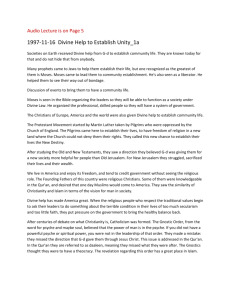
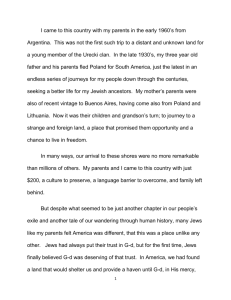
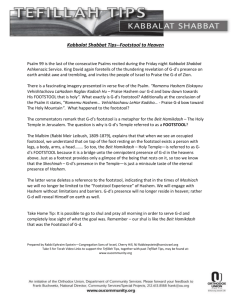
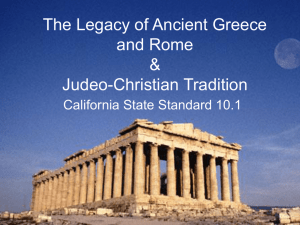
![September 13, 2015 Sermon 1st night Rosh[...]](http://s3.studylib.net/store/data/006863751_1-791ae0c3db233f228e8fd60834a01a65-300x300.png)
